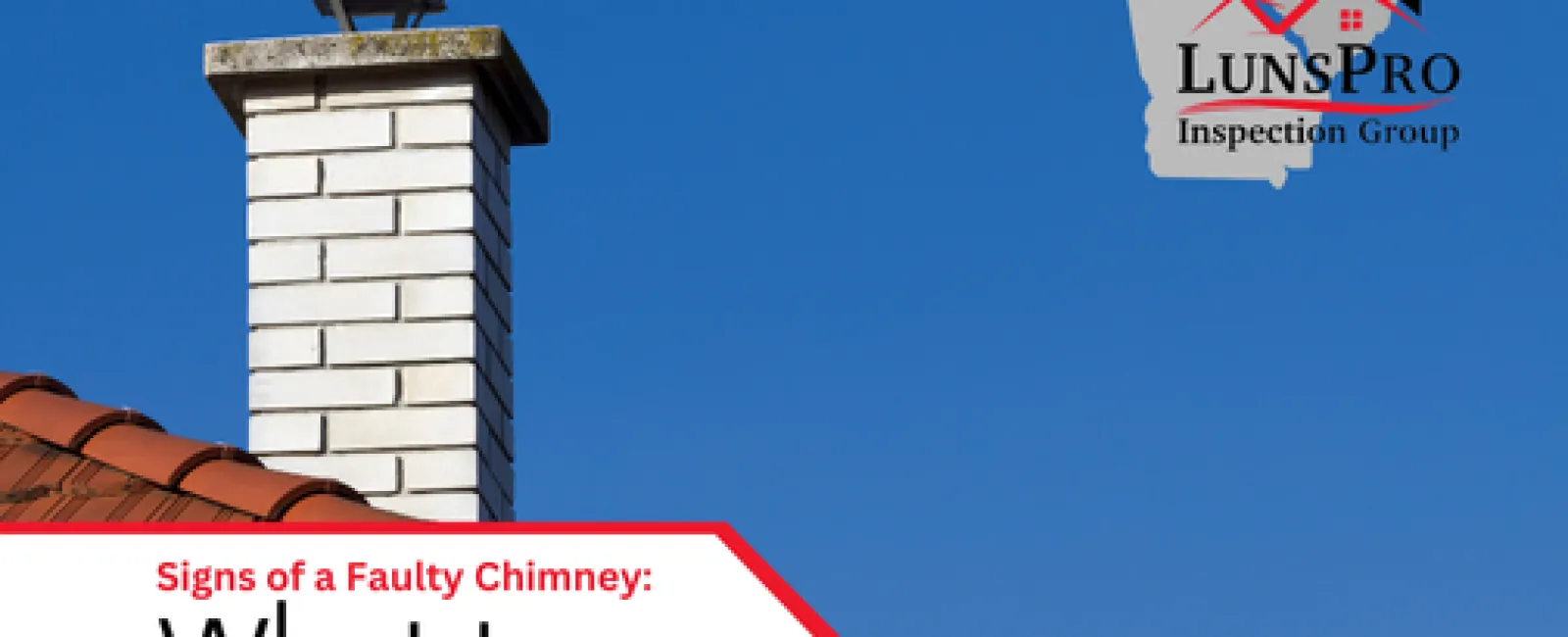A well-maintained chimney is essential for the safety and efficiency of your home. However, over time, even the most robust chimneys can develop issues. Spotting the signs of a faulty chimney early can prevent costly repairs and ensure the safety of your household. This comprehensive guide will help you identify the warning signs of a chimney in need of attention and how a professional inspection from LunsPro Inspection Group, a team of trusted Charlotte, NC home inspector, can help.
1. Cracked or Damaged Chimney Crown
The chimney crown is the protective layer at the top of the chimney, designed to keep water and debris out. Cracks or damage to the chimney crown are common signs of wear and tear. Over time, exposure to the elements can cause the crown to deteriorate, leading to water infiltration. If left unchecked, this can result in more severe structural damage to the chimney and surrounding areas.
What to Look For:
- Visible cracks in the crown
- Chunks of the crown material found in the fireplace or around the chimney base
- Signs of water pooling on the crown
A thorough inspection by a Carolina home inspector can identify these issues and recommend necessary repairs.
2. White Staining (Efflorescence)
Efflorescence appears as a white, powdery substance on the exterior of the chimney. This staining is caused by moisture that seeps into the chimney, dissolving salts within the masonry, and then evaporating, leaving behind the white residue. While efflorescence itself isn't harmful, it is a clear indicator that your chimney is experiencing excessive moisture. Over time, this can lead to more serious issues, such as weakened masonry or even structural failure.
What to Look For:
- White powdery deposits on the chimney exterior
- Persistent moisture issues around the chimney
- Peeling paint or wallpaper near the chimney inside the home
Addressing moisture issues early with the help of Carolina residential and commercial inspections can save homeowners from more extensive repairs down the line.
3. Spalling Bricks
Spalling occurs when water penetrates the bricks of the chimney, causing the surface to peel, flake, or pop off. This is especially common in older chimneys or those exposed to harsh weather conditions. Spalling is a significant issue because it compromises the integrity of the chimney structure, leading to potential collapse if not addressed promptly.
What to Look For:
- Bricks with chipped or flaking surfaces
- Loose bricks around the chimney base or on the roof
- Crumbling mortar between the bricks
Spalling bricks are a serious concern that requires immediate attention from a Carolina home inspector.
4. Damaged or Deteriorating Mortar Joints
The mortar joints between the bricks of your chimney are crucial for maintaining its structural integrity. Over time, exposure to moisture, temperature changes, and general wear can cause the mortar to deteriorate. Damaged mortar joints allow water to penetrate the chimney, leading to further damage, including the risk of chimney collapse.
What to Look For:
- Gaps or cracks in the mortar between bricks
- Crumbling or missing mortar
- Water stains on the chimney or interior walls near the chimney
A professional Carolina drone inspection can provide a close-up view of the mortar joints, ensuring that even hard-to-reach areas are thoroughly evaluated.
5. Rusted or Corroded Chimney Components
Rust on any metal components of your chimney, such as the damper, firebox, or flashing, is a sign of excessive moisture. Rust can weaken these components, making them less effective and increasing the risk of fire or structural damage. In some cases, rust may also indicate that the chimney cap is missing or damaged, allowing water to enter the chimney freely.
What to Look For:
- Visible rust on the damper, firebox, or other metal parts
- Difficulty operating the damper due to rust buildup
- Water stains or rust marks on the interior walls near the chimney
If rust is detected, a Carolina septic and sewer scope inspection may be necessary to determine if the issue extends beyond the chimney.
6. Poor Draft or Smoke Backflow
A properly functioning chimney should create a strong draft that pulls smoke and combustion gases up and out of your home. If you notice smoke backflow or a weak draft, it could indicate a blockage, damage, or poor design. This issue not only affects the efficiency of your fireplace but also poses a serious health risk due to the potential buildup of carbon monoxide in your home.
What to Look For:
- Smoke entering the room instead of rising up the chimney
- A persistent smoky smell in your home, even when the fireplace isn't in use
- Difficulty starting or maintaining a fire
In such cases, Carolina radon testing might also be advisable to ensure there are no harmful gases accumulating in your home.
7. Shaling Flue Tiles
The flue liner inside your chimney plays a crucial role in protecting the chimney walls and improving efficiency. Shaling, which is the flaking off of the flue tiles, is a sign that the liner is deteriorating. If not addressed, this can lead to more severe damage and increased risk of fire.
What to Look For:
- Thin pieces of flue tiles accumulating in the fireplace
- Visible cracks or damage to the flue liner
- Unusual sounds from the chimney during use
A Carolina mold and air quality testing service can ensure that there are no hidden issues resulting from a compromised flue liner.
8. Leaks and Water Damage
Water is the enemy of chimneys. Leaks can cause a wide range of issues, from rusted components to mold growth and structural damage. Signs of water damage often indicate that there is a problem with the chimney cap, flashing, or masonry that needs to be addressed immediately.
What to Look For:
- Water stains on the walls or ceiling near the chimney
- Damp or musty odors in the area around the chimney
- Visible leaks or drips inside the fireplace
Regular Carolina pool inspections can help catch these issues early.
Chimneys are often overlooked in home maintenance, but they play a vital role in the safety and comfort of your home. Recognizing the signs of a faulty chimney early can prevent minor issues from becoming major problems. If you notice any of these warning signs, it's essential to schedule an inspection with LunsPro Inspection Group. As a leading Charlotte, NC home inspector, we offer comprehensive Carolina residential and commercial inspections, including Carolina drone inspections, septic and sewer scope inspections, radon testing, mold and air quality testing, and pool inspections. Our expert team is dedicated to ensuring that your home is safe, efficient, and well-maintained.

